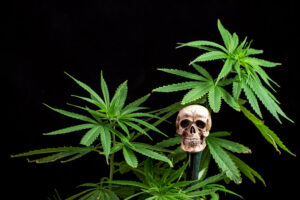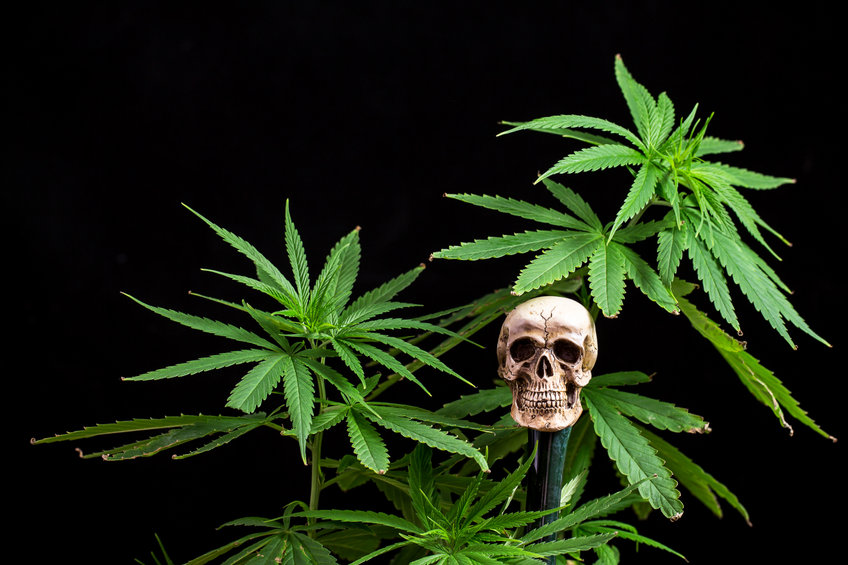
Attempts to legalize recreational marijuana in PA with Senate Bill 350, the “Adult-Use Cannabis Act,” failed. But efforts to do so have not stopped. In September of 2021, State Representatives Jake Wheatley and Dan Frankel sponsored H.B. 2050, which would legalize adult-use recreational marijuana. Not to be outdone, State Senators Dan Laughlin and Sharif Street introduced Senate Bill 473 to legalize recreational marijuana in October of 2021. Laughlin and Street believe their bi-partisan bill has the best chance of ultimately legalizing recreational marijuana in Pennsylvania, and could generate between $400 million and $1 billion of new tax revenue. But what are the risks of such legislative action?
Larry Weigand, who was running for sheriff in Delaware County, said he understood that social views on marijuana use have changed and polls report most Pennsylvanians support legalization. “But the social views of intoxication and driving under the influence have not; to the contrary, they have become more stringent.” He thought the legislature needs to be considerate of both sides of the issues, considering all who would be affected, “including the non-users of marijuana and law enforcement.”
Negative Consequences in Colorado
Consider the negative consequences of legalization in Colorado reported in The New York Times, “Reefer Madness or Pot Paradise?” Legalization coincided with a 20 percent rise in violent crime rates in Colorado, while marijuana-related arrests fell by half. Although low-level marijuana charges dropped, racial discrepancies in drug arrests persisted. African-Americans were still being arrested on marijuana charges almost twice as often. One of the state legislators who endorsed the Colorado ballot measure that legalized recreational marijuana said: “You don’t see drug-addled people roaming the streets, but we haven’t created a utopia.”
Since recreational sales began in 2014, more people in Colorado are going to emergency rooms for marijuana-related problems. Hospitals report higher rates of mental health cases associated with marijuana. An emergency room physician and researcher with the University of Colorado Hospital, Andrew Monte, analyzed hospital data that showed more people were arriving at ERs for marijuana-related reasons. He said, “There’s a disconnect between what was proposed as a completely safe drug.”
Other researchers in “Marijuana and acute health care contacts in Colorado” reported that marijuana-related ER patients were five times as likely to have a mental-health issue as those with other cases. “As more states legalize marijuana, it is important to address public education and youth prevention, and understand the impact on mental health disorders.” The most frequent primary diagnosis of ER visits with marijuana-related billing codes compared to those without marijuana-related billing codes was for mental illness.
Among primary diagnosis categories, mental illness was more prevalent in ED visits and hospitalizations with marijuana-related billing codes. Examination of the role marijuana plays in mental health driven healthcare encounters is critical given the relationship between drug use disorders and mental health disorders. While it is unclear whether this finding is reflective of changes due to a legal market, it clearly prioritizes the consequences of marijuana use within a mental health population as a priority area for further research.
Psychosis and Marijuana
While political rhetoric in favor of legalization is calling for the end of marijuana “prohibition,” scientific research is forming a consensus that THC, the psychoactive cannabinoid in marijuana, induces psychotic symptoms. A research article published in The Lancet Psychiatry, “Psychiatric symptoms caused by cannabis constituents,” included additional evidence for that consensus. The authors readily acknowledged that cannabis was one of the most widely used psychoactive substances worldwide, with 6-7% of Europeans and 15.3% of Americans using it each year. Decriminalization and legalization trends were happening globally, with Canada, Uruguay and a growing number of US state permitting the sale and recreational use of marijuana. However,
Given the projected increase in rates of cannabis use, the increasing potency of cannabis and cannabis-based products, and the burgeoning interest in the therapeutic potential of cannabinoids, it is timely to assess the psychiatric effects of cannabis constituents.
The researchers demonstrated that THC induced significant increases of symptoms as they were reported on psychiatric scales, the Brief Psychiatric Rating Scale (BPRS) and the Positive and Negative Syndrome Scale (PANSS). Positive symptoms included delusions and hallucinations; negative symptoms included blunted affect and amotivation; and general symptoms included depression and anxiety. Effect sizes were greater for positive symptoms than negative symptoms, but not for general symptoms. This finding suggested that THC induced positive symptoms like psychosis to a greater extent than negative symptoms.
Speaking with Healio Psychiatry in “THC linked to psychiatric symptoms with large effect sizes,” Oliver Howes, one of the co-authors, said: “These findings highlight a potential risk of taking THC-containing cannabis products, and, importantly, show that THC can lead to short-term psychotic symptoms even in people with no history of mental illness or other risk factors.” While there has been previous evidence for the association of positive psychiatric symptoms and marijuana, Howes said he was surprised that THC induced other psychiatric symptoms like social withdrawal.
In conclusion, these findings demonstrate that the acute administration of THC induces positive, negative, and general psychiatric symptoms with large effect sizes. By contrast, CBD does not induce psychiatric symptoms, and there is inconclusive evidence that it moderates the induction of psychiatric symptoms by THC. These effects are larger with intravenous administration than with inhaled administration, and tobacco smokers have less severe positive symptoms. These findings highlight the acute risks of cannabis use, which are highly relevant as medical, societal, and political interest in cannabinoids continues to grow.
In a related editorial published in the same issue of The Lancet Psychiatry, “THC: harmful even in low doses?”, Carsten Hjorthøj, and Christine Merrild Posselt said there was a growing scientific consensus that marijuana does have a causal role in the development of psychosis. And they thought the association seems to be bidirectional. “In some people, cannabis leads to incident psychosis, whereas in other people, psychosis leads to incident cannabis use.” However, they noted this consensus was not reflected in mainstream public discourses, “which have a major effect on the political agenda to decriminalize cannabis.”
Referring to “Psychiatric symptoms caused by cannabis constituents,” Hjorthøj and Posselt said finding large effect sizes for general psychiatric symptoms, even with low doses of THC, was “extremely important and worrying.”
Moreover, the authors failed to find any clear evidence that concurrent administration of cannabidiol (CBD) reduced these symptoms. Indeed, such an ameliorating effect was observed in only one of four included studies. This finding is notable because CBD in particular is being touted as a potential wonder drug with antipsychotic, anxiolytic, and other properties. . . As Hindley and colleagues have clearly demonstrated, there are at least transient psychiatric symptoms associated with even relatively low doses of THC. Of course, this result should not be extrapolated as meaning that single doses of THC will eventually lead to schizophrenia or other severe disorders. However, it might be prudent to extrapolate and paraphrase the words of Moore and colleagues from their 2007 meta-analysis to apply to both recreational and medicinal use of THC-containing cannabis: “there is sufficient evidence to warn people that using THC could increase their risk of developing psychiatric symptoms or even a psychotic illness”.
So, pointing to the potential for increased tax revenue, the opportunity for new jobs in the marijuana industry, and all the other supposed benefits of ending the so-called ‘prohibition’ of recreational marijuana is not enough. Pennsylvania also needs to consider the risks to its citizens if it legalizes recreational marijuana. And one of them is people who use cannabis increase their risk of experiencing psychosis and other psychiatric symptoms.
There are several other articles on the risk of psychosis with marijuana on this website, and the concerns for Pennsylvania if recreational marijuana is legalized in the Commonwealth. Here are a few: “Cannabis and Psychosis: More Reality Than Satire,” “Telling the Truth About Marijuana and Psychosis,” “The Business of Legalizing Marijuana in PA,” and “Should Pennsylvania Go ‘Full Colorado’ with Marijuana?” Part 1 and Part 2.





